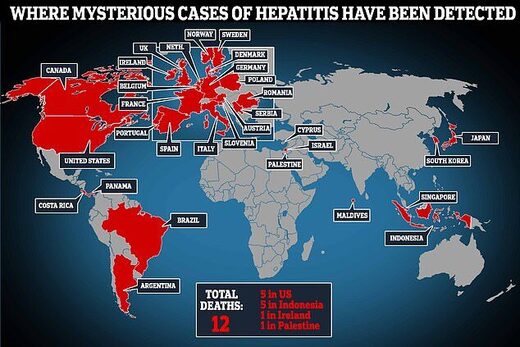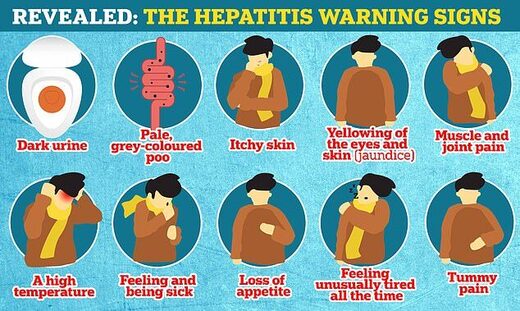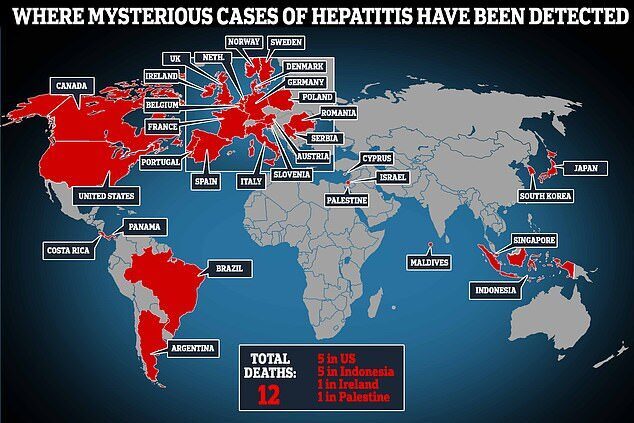Another 18 British children have fallen ill with the mystery hepatitis that has caused a spate of cases around the world. Health officials announced the new cases today, bringing the cumulative UK total to 240 since the first was spotted in...

www.sott.net
Connor Boyd
Daily Mail
Thu, 09 Jun 2022 18:05 UTC

The mystery hepatitis has been spotted in the US, Western Europe and a handful of other countries. Globally, at least 12 youngsters have died and dozens needed liver transplants
Another 18 British children have fallen ill with the mystery hepatitis that has caused a spate of cases around the world.
Health officials announced the new cases today, bringing the cumulative UK total to 240 since the first was spotted in January.
Of the confirmed patients,
170 were in England, 32 in Scotland, 21 in Northern Ireland and 17 in Wales.
They are
predominantly in children under five — but a 'small number' of children aged over 10 have also been struck down.
Scientists still do not know what is causing the life-threatening liver disease, but they say the chief culprit is a strain of the common cold.
A leading theory is that children's immune systems have been weakened because of lockdowns and school closures during the pandemic.
The complication
has been spotted in around 650 children in Europe, the US, South America, Middle East and Asia.
Comment: It's notable that nearly a third of cases have been reported in the UK, despite lockdowns being enforced over much of the globe, and some of those nations had even harsher and longer lockdowns; which begs the question: Why is the UK suffering from so many cases?
Other countries have an equal or superior health service, which might rule out the simple matter of more accurate detection.
At least a dozen youngsters have died and tens of children have needed liver transplants. No children have died in the UK.
Announcing the new cases today, Dr Sophia Makki, incident director at the UK Health Security Agency, said: The likelihood of children developing hepatitis remains extremely low.
'Maintaining normal hygiene measures, including making sure children regularly wash their hands properly, helps to reduce the spread of many common infections, including adenovirus.'
The normal culprits - hepatitis A, B, C, D and E viruses - have been excluded from laboratory test results of recent cases.
Experts are now working under the theory that they are being triggered by a group of viruses that normally cause the common cold, known as adenoviruses.
It is unclear if a mutated strain of adenovirus has evolved to become more severe, or if a lack of social contact during the pandemic has made children more vulnerable to existing strains.
Dr Makki: 'We continue to remind everyone to be alert to the signs of hepatitis - particularly jaundice, look for a yellow tinge in the whites of the eyes - and contact your doctor if you are concerned.'
UKHSA officials said there is no evidence the Covid vaccine is involved as most cases have been in children under five years old, who have not been jabbed.
Comment: Maybe not, but were their parents and teachers? And, if so, could it be related to their injections? The apparent localisation of these cases may be related to particular batches, brands or types of vaccines. Were the children's guardians shedding a particular virus? In addition, breast feeding is known to transmit viruses.
They are due to release a preliminary findings report next week.
Symptoms of the complication normally start with diarrhoea or sickness. It then can cause the skin and eyes to turn yellow.
The US has recorded 216 cases across 37 states, with Mississippi and Utah the latest to be added to the growing list.
No new deaths or liver transplants were reported over the last seven days, the Centers for Disease Control and Prevention (CDC) revealed in their weekly update with the totals remaining at 14 and six respectively.
The agency has not revealed where the fatalities occurred due to 'confidentiality issues', but at least one was registered in Wisconsin health chiefs in the state say.
Comment: Which prevents us from ascertaining whether it was related to a particular batch or brand of vaccine. Previous reports noted 'hot spots' of cases.
Globally, the UK has now recorded the most confirmed and suspected cases out of any nation — although this may be because of stronger surveillance than other nations.
Comment: This health emergency has been going on for since at least April, it's unlikely that this is simply due to 'stronger surveillance'.
Top experts fear health chiefs won't understand what's behind the peculiar pattern — which has been sickened at least 520 children worldwide since March — for months.
While mild liver inflammation is not uncommon in children, severe illness as seen in these cases is.
The mysterious liver inflammation has also been more than 200 cases in the US across 37 states.

Q&A: What is the mysterious global hepatitis outbreak and what is behind it?
What is hepatitis?
Hepatitis is inflammation of the liver that is usually caused by a viral infection or liver damage from drinking alcohol.
Some cases resolve themselves, with no ongoing issues, but a fraction can be deadly, forcing patients to need liver transplants to survive.
What are the symptoms?
People who have hepatitis generally have fatigue, loss of appetite, nausea, vomiting, abdominal pain, dark urine, light-colored stools and joint pain.
They may also suffer from jaundice — when the skin and whites of the eyes turn yellow.
Why are experts concerned?
Hepatitis is usually rare in children, but experts have already spotted more cases in the current outbreak than they would normally expect in a year.
Cases are of an 'unknown origin' and are also severe, according to the World Health Organization.
What are the top theories?
Weakened immunity
British experts tasked with investigating the spate of illnesses believe the endless cycle of lockdowns may have played a contributing role.
Restrictions may have weakened children's immunity because of reduced social mixing, leaving them at heightened risk of adenovirus.
This means even 'normal' adenovirus could be causing the severe outcomes, because children are not responding to it how they did in the past.
Adenovirus mutation
Other scientists said it may have been the adenovirus that has acquired 'unusual mutations'.
This would mean it could be more transmissible or better able to get around children's natural immunity.





